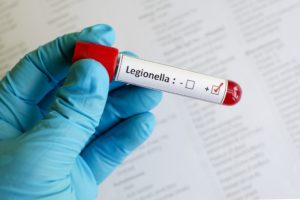 Legionella is a type of bacterium that is typically found in freshwater environments; however, it can also grow in man-made water systems such as cooling towers for industrial air conditioning mechanisms, grocery store misting machines, decorative fountains, as well as hot water tanks and heaters.
Legionella is a type of bacterium that is typically found in freshwater environments; however, it can also grow in man-made water systems such as cooling towers for industrial air conditioning mechanisms, grocery store misting machines, decorative fountains, as well as hot water tanks and heaters.
Exposure to Legionella is known to cause legionnaire’s disease which is a severe form of pneumonia. This disease can develop after a person breathes in small droplets of water contaminated by bacteria. Infection may also occur through aspiration -when water accidentally gets into the lungs while drinking.
Legionnaire’s disease usually develops between two to 10 days after exposure to legionella. The most common symptoms include:
- Coughing
- Fever
- Shortness of breath
- Muscle aches
- Chills
- Headaches
- Chest pain
- Gastrointestinal symptoms such as diarrhea, nausea or vomiting
Some people are more prone to develop legionnaire’s disease than others. Individuals who are most at risk include:
- Smokers
- Adults who are 50 years of age and older
- People with weakened immune systems
- Those who have a chronic lung disease
Treatment of legionnaire’s disease involves the administration of antibiotics and may require hospitalization. If symptoms are left untreated they can develop into life-threatening conditions such as septic shock, respiratory failure and acute kidney failure.
Legionnaire’s disease can be prevented. According to the Centers for Disease Control and Prevention (CDC), “the key to preventing Legionnaires’ disease is to make sure that building owners and managers maintain building water systems.” Smokers are also advised to quit smoking, as this can reduce their risk.
To learn more about Legionnaire’s disease please visit https://www.cdc.gov/legionella/index.html
All content of this newsletter is intended for general information purposes only and is not intended or implied to be a substitute for professional medical advice, diagnosis or treatment. Please consult a medical professional before adopting any of the suggestions on this page. You must never disregard professional medical advice or delay seeking medical treatment based upon any content of this newsletter. PROMPTLY CONSULT YOUR PHYSICIAN OR CALL 911 IF YOU BELIEVE YOU HAVE A MEDICAL EMERGENCY.
